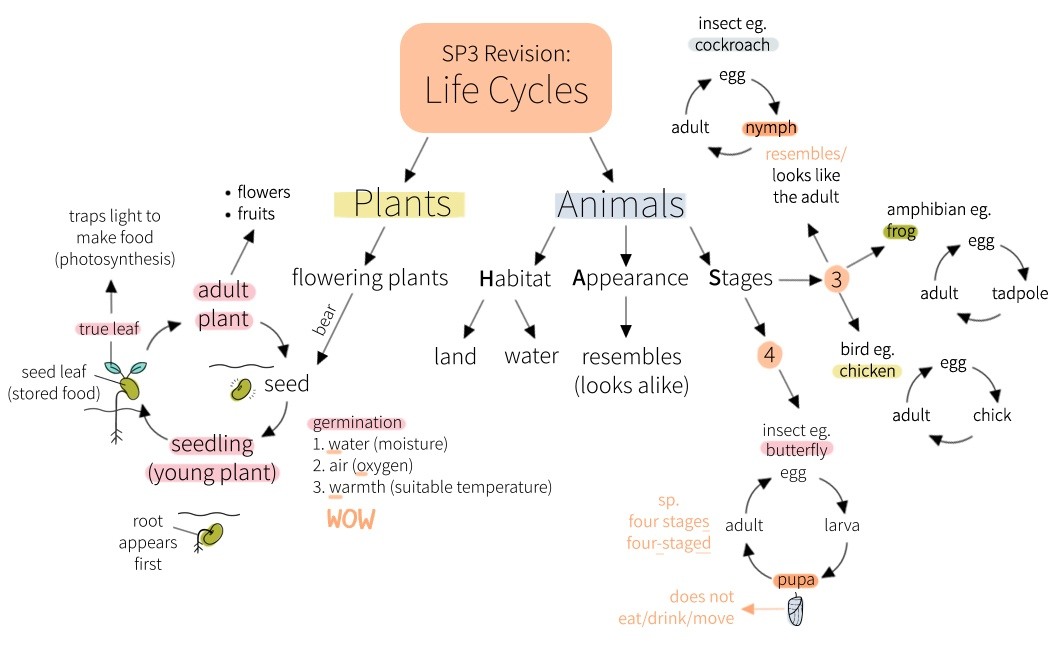
What makes a successful student?
Having efficient study routines can definitely make schooling and learning more effective. These routines guide the learner towards a goal — in this case, better academic results.
When these practices and routines are reinforced and repeated, they become ingrained habits. These habits help your child become not only a better performing student, but also a more well-rounded individual. One who is confident in learning new skills, feels unafraid of evolving paths and is ready to embrace challenges.
1. Being Mindful of Schedules and Timing

Keeping organised with schedules gives smart learners an overview of their activities and helps them develop consistency and commitment to a task.
It also teaches students to take accountability for their actions — if they have an assignment due on a certain date, they should be able to structure their tasks with this deadline in mind.
Having a keen sense of timing is an important life skill to have, as it leads to better working discipline and prioritisation. It can also be helpful in social situations; for instance, in knowing when to enter a conversation, when to broach a sensitive subject, or when to offer opinion.
When combined, being on top of schedules will be useful in helping your child not only manage school work but also in achieving personal goals.
To help your child build this habit, try asking the following questions:
-
Do you work better right after school or after you've eaten dinner?
-
Are you more productive in 90-minute blocks or half-hour blocks?
-
What are the tasks you have to complete today? Which is the most urgent one?
By understanding your child’s natural preferences and helping your child see how to match them with tasks on hand, you can optimise his or her learning.
2. Raising Questions and Sharing Opinions

Students are sometimes shy to ask questions or share their thoughts when they don’t understand a particular subject, method, or instruction.
This may happen when your child learns a new topic in class or encounters a difficult topic.
“As a teacher, I always remind my students to clarify any doubts they may have, especially right after a new topic or concept has been taught. It is important for your child to ask questions as soon as any doubts arise and not to wait until the following week. This prevents him or her from being further confused or from having misconceptions about the topic or concept later on,”
— Mrs Feodora Yong, Academic Director at TLL
An article by Better Health — an Australian state government website, shares that a “shy child is most likely to be nervously constrained if they feel they are 'on show', such as having to speak in front of others”.
Help your child feel comfortable with sharing personal views by using open-ended questions at home, such as, “What did you like about that meal?” instead of, “Did you enjoy your food?”. This will boost your child’s confidence in articulating an opinion and enriches your child’s vocabulary.
To build curiosity and the confidence to raise questions, verbalise your actions (and the reasons for doing them) out loud. Bring your child through your thought process, and ask if he or she has any questions on what you’ve shared. You should then answer the question in a clear and detailed manner.
Related Article: 5 Effective Ways To Raise A Confident Child
Your child will learn, over time, that raising questions is the most effective way to learn more about the task or information on hand. It’ll also build critical thinking skills, which will benefit your child in answering complex questions or engaging in a discussion with friends.
3. Taking Notes and Creating Concept Maps
Note-taking isn’t merely copying words from a printed text or from a whiteboard.
It is an intimate way of connecting with information by noting the details that resonate with the writer. It helps with remembering the essence of a message and allows for future review of key points without the distraction of the irrelevant text in between.
“When taking notes of a presentation, we maintain a short-term memory buffer in order to acquire, mentally represent, select and understand the continuous flow of incoming new information and to update and interact with the already-stored knowledge”, states an article by the British Journal of Educational Technology.
Notes can come in different forms. For example, you can teach your child to create ‘mind maps’ or ‘concept maps’ which show the development of ideas through visual association. It is a great way for visual learners to consolidate, review and revise what they have learnt.

Alternatively, your child can try using bullet points for short and concise note-taking on a factual topic.
As your child progresses through the year, there will be more content to cover. Hence, a careful consolidation of knowledge will be key for effective revision and information retention, especially when the exam period is near.
4. Practising Active Listening

Students who practise active listening tend to have better memory and stronger relationships with their peers.
Mind Tools mentions that by becoming a better listener we can improve our productivity, as well as our ability to influence, persuade and negotiate. It also helps us avoid conflict and misunderstandings.
To practise active listening and teach your child how to give people undivided attention during conversations, encourage your child to demonstrate the following:
-
Look the other person in the eye
Eye contact is important in establishing trust and a friendly connection.
-
Listen without the intention of speaking
Sometimes we miss a message because we are too busy formulating an advanced response to what others are currently saying.
-
Acknowledge what the other person is saying
By nodding, smiling or showing some gesture of understanding, you can encourage the speaker to find the right words they are trying to communicate.
In school, active listening will help your child understand different points-of-view in class.
This will also help your child be more open-minded when dealing with differing opinions. It also helps with remembering and recalling important information shared by their teachers.
5. Adopting a Growth Mindset

When your child adopts a growth mindset, he or she believes that it is possible to learn and improve from mistakes, and that challenges are part and parcel of the learning process.
Help your child shift from a ‘fixed’ mindset — the belief that we are good or not good at certain tasks; to a ‘growth’ mindset — the belief that skills can be developed through perseverance, creative strategies and feedback from others.
You can nurture this growth mindset by acknowledging your child’s effort in not just completing tasks, but actually learning from those tasks. Remember that outcomes do matter as it shows progressive effort over superficial effort.
Related Article: 5 Tips to Encourage A Positive Learning Mindset
You can also ask questions like, “What do remember most from that project?” or “Why do you think you failed?” These questions can help you to gauge your child’s understanding of his or her victories and failures, and the events that led to the results.
By letting your child know that his or her learning possibilities are endless, you are enabling him or her to develop a positive attitude to embrace challenges in school and beyond.
Helping Children Prepare for Life's Tests
From preschool to pre-tertiary, our students enjoy fun, interactive and relevant lessons and are empowered to think beyond the confines of the classroom.
We motivate them to do their best in school whilst learning to dream big, plan well and achieve success.
The Learning Lab is now at locations. Find a location that suits your needs.
If you have any questions about our programmes, please email us at enquiry@thelearninglab.com.sg or call us at 6733 8711 and we will be happy to assist you.

